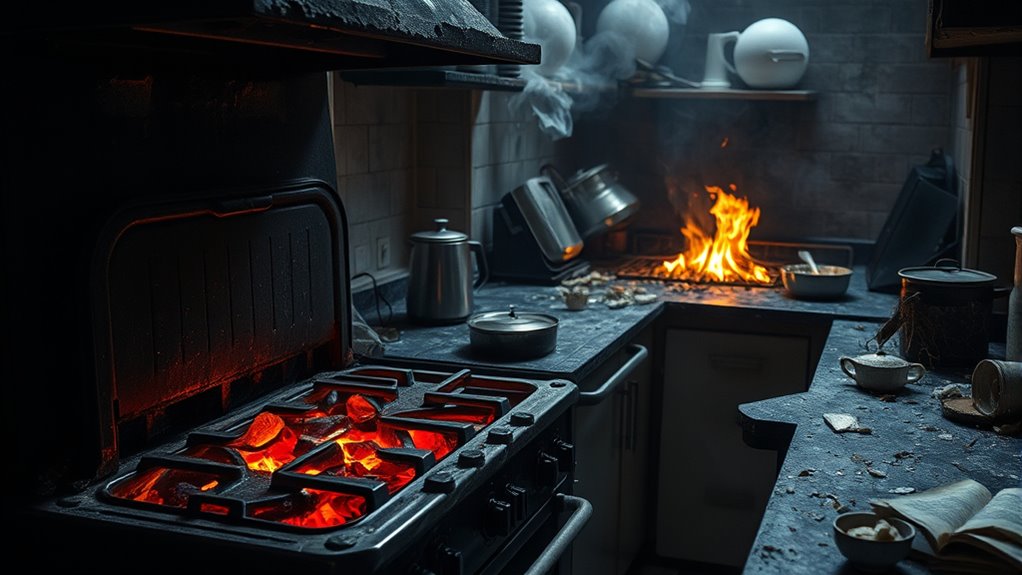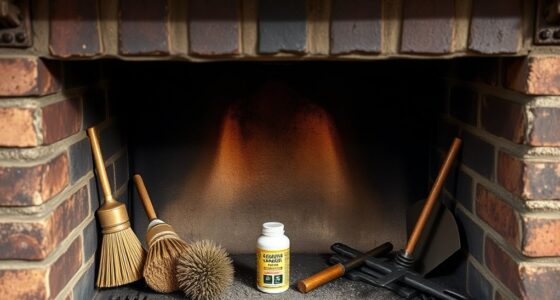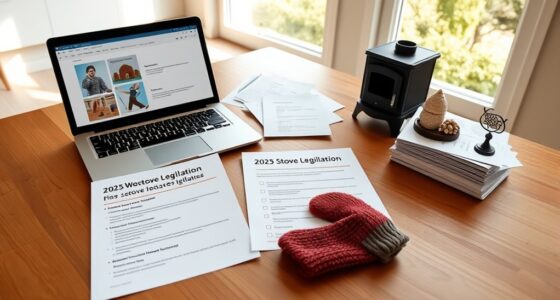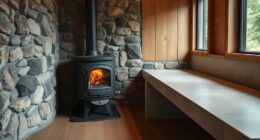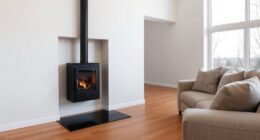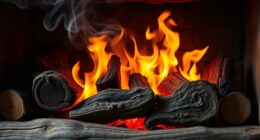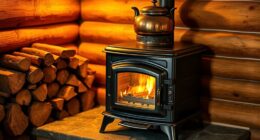If your stove causes a fire, liability depends on whether the cause was a product defect, poor maintenance, or user neglect. If the appliance had a manufacturing flaw, the manufacturer might be held responsible. But if neglect or improper upkeep led to the fire, you could face legal or insurance issues. Understanding where the fault lies is key, and exploring more details can help you better protect yourself and clarify your responsibilities.
Key Takeaways
- Liability depends on whether the fire was caused by appliance defect or homeowner neglect.
- Proper maintenance and timely repairs can influence liability and liability defenses.
- Product defects known or discoverable may lead to manufacturer liability claims.
- Insurance coverage and legal responsibility hinge on identifying if the cause was neglect or defect.
- Documenting maintenance and repairs strengthens your position in liability disputes.
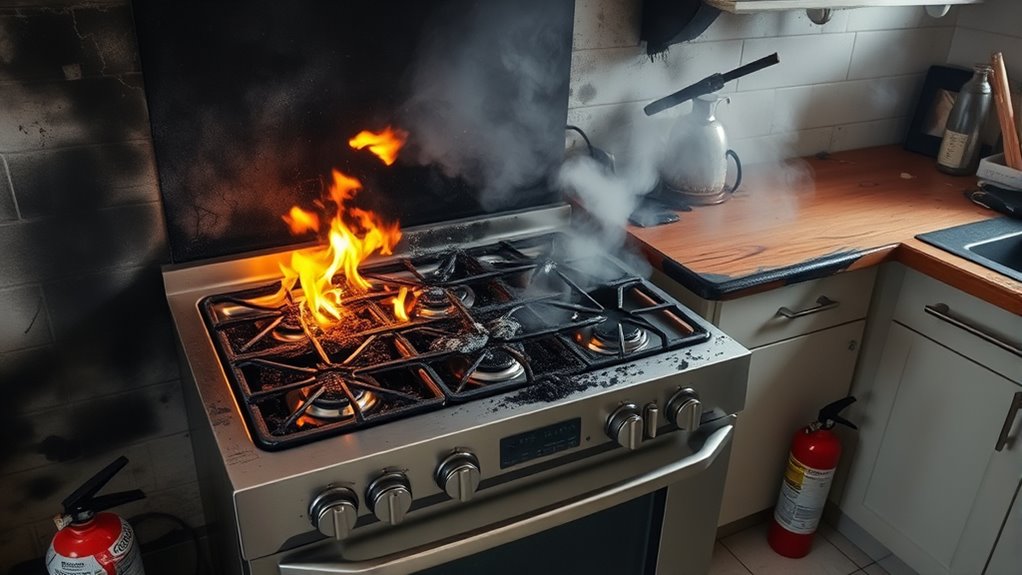
Liability issues can be complex and often determine who is responsible when things go wrong. When it comes to a stove causing a fire, understanding liability means examining several factors, especially appliance malfunctions and maintenance responsibilities. If your stove unexpectedly sparks or overheats, leading to a fire, questions arise about whether you or the manufacturer bears the blame. Appliance malfunctions are a common cause of kitchen fires, often resulting from defective parts, wiring issues, or manufacturing defects. However, pinpointing fault isn’t always straightforward, as it involves investigating whether the malfunction was due to a defect or neglect on your part.
Your role in maintenance responsibilities becomes essential here. As a homeowner or renter, you’re typically expected to keep appliances in good working order, which includes regular cleaning, inspections, and prompt repairs when issues arise. If you fail to perform necessary maintenance and your stove malfunctions as a result, liability could shift toward you. For example, ignoring signs of wear or neglecting to repair a faulty component might be seen as contributing to the fire. Conversely, if the malfunction stems from a manufacturing defect that you couldn’t have prevented through maintenance, the manufacturer or seller might be held liable. This distinction is key in determining who bears financial responsibility and legal accountability.
Maintaining appliances properly is crucial to avoid liability in fire incidents.
Insurance companies and legal systems often scrutinize these details during claims or lawsuits. If a fire is traced back to an appliance defect, manufacturers may face product liability claims, especially if the defect was known or should have been known through standard inspections. On the other hand, if neglect or improper maintenance played a role, your homeowner’s insurance might cover damages, but you could also be held partially responsible for negligence. It’s important to keep records of maintenance routines and repairs, as these can serve as evidence in disputes over liability.
Furthermore, understanding your rights and responsibilities can help you mitigate liability risks. Regularly inspecting your appliances, adhering to manufacturer guidelines, and addressing issues promptly can reduce the chances of appliance malfunctions leading to fires. If a fire does occur, documenting your maintenance efforts and seeking professional assessments can strengthen your position. Ultimately, liability hinges on whether the fire resulted from a defect beyond your control or from your failure to perform reasonable maintenance. Recognizing these distinctions can protect you legally and financially, making it essential to stay vigilant with appliance maintenance and aware of your responsibilities.
Being aware of product liability laws and regulations related to appliance defects can further clarify your rights and options in these situations.
Top picks for "liability issu happen"
Open Amazon search results for this keyword.
As an affiliate, we earn on qualifying purchases.
Frequently Asked Questions
Can I Sue My Landlord if the Stove Causes a Fire?
Yes, you can sue your landlord if their negligence in fire safety or landlord liability caused the fire. If they failed to maintain the stove or ensure proper safety measures, you have grounds for a legal claim. You should document the damage and consult an attorney to evaluate your case. Landlord liability depends on whether they breached their duty to provide a safe living environment, especially regarding fire safety.
What Evidence Is Needed to Prove the Stove Was Faulty?
To prove your stove was faulty, you’ll need evidence like a fire inspection report showing defects or safety violations. Gather maintenance records and check if the appliance is still under warranty, which can support your claim. Photos of the stove’s damage and witness statements can also help. Collecting this evidence helps establish the appliance’s fault and strengthens your case if you pursue legal action or a warranty claim.
Are There Insurance Policies That Cover Stove-Related Fires?
Sure, there are insurance policies that cover stove-related fires, but don’t count on them to make fire safety a joke. Your homeowner’s or renters insurance often includes fire coverage, protecting you from damages caused by kitchen mishaps. Just remember, having coverage is smart, but it’s no substitute for practicing safe cooking habits—after all, the real fire safety starts with you, not the policy.
How Long Do I Have to File a Liability Claim?
You should file your liability claim promptly, as most insurance policies require timely filing within specific claim deadlines. Generally, you have a limited window—often a few months—to report the incident after the fire occurs. Delaying too long can jeopardize your chances of coverage or compensation. To protect your rights, contact your insurer as soon as possible and make sure your claim is submitted within the required time frame.
Does Homeowner’s Insurance Automatically Cover Stove Fires?
Your homeowner’s insurance may not automatically cover stove fires; it depends on your policy. To guarantee protection, practice fire prevention and regularly maintain appliances. Keep your stove clean, check for faulty wiring, and fix issues promptly. Contact your insurer to confirm coverage specifics, and consider adding extra fire protection if needed. Staying proactive with appliance maintenance minimizes fire risks and helps ensure you’re covered if an accident occurs.
Conclusion
So, next time your stove unexpectedly sparks a blaze, remember—you might just be cooking up more than dinner. While you’d hope technology keeps you safe, sometimes it’s your own liability that burns the biggest hole in your pocket. Irony’s a funny thing: the very device meant to make life easier can turn your peaceful evening into a costly lesson. Stay alert, because in the end, you’re the one holding the fire’s leash.

